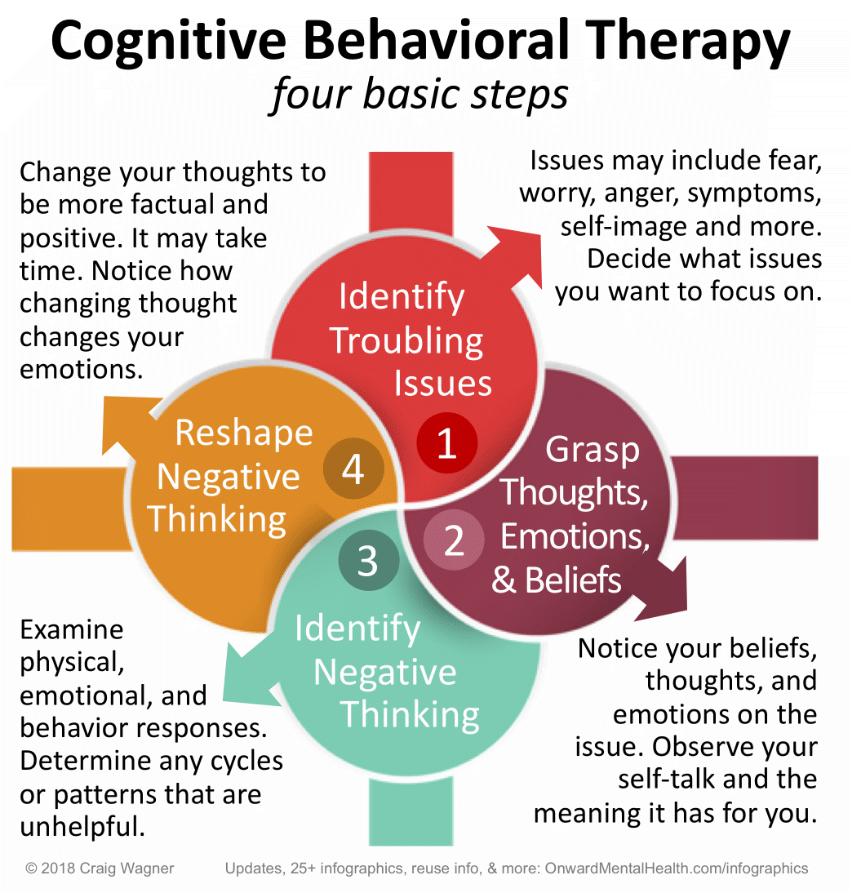The Goal of Cognitive-behavioral Therapy Is Best Described as
Cognitive behavioral therapy CBT is a psycho-social intervention that aims to reduce symptoms of various mental health conditions primarily depression and anxiety disorders. It generally requires fewer sessions than other types of therapy and is done in a structured way.
The goal of cognitive-behavioral therapy is BEST described as.

. Cognitive behavioral therapy CBT is a form of psychological treatment that has been demonstrated to be effective for a range of problems including depression anxiety disorders alcohol and drug use problems marital problems eating disorders and severe mental illness. What is cognitive-behavioral therapy. The long-term goal of cognitive-behavioral counseling is best described by which of the following statements.
Unlike psychoanalysis for example it does not deal primarily with the past. Cognitive behavioral therapy is a problem-oriented strategy. The goal is to enable clients to independently solve their own problems by recognizing dysfunctional thoughts and behaviors early enough to.
A improving the clients interactions with others. One is cognitive restructuring or an attempt to recon ceptualize the problems presented by a disorder into a form that does not contribute to its severity. Unlike psychoanalysis for example it does not deal primarily with the past.
However often insufficient attention is directed toward disseminating best practices in supervision of CBT with youth. This Therapeutic Advances contribution aims to communicate the core content of. Replace automatic thoughts with more objective thoughts.
The goal is to enable clients to independently solve their own problems by recognizing dysfunctional thoughts and behaviors early enough to. Because cognitive behavioral therapy is tailored to the needs of the individual the goals of each therapy session are unique based on the clients personal circumstances. Cognitive behavioral therapy focuses on changing the automatic negative thoughts that can contribute to and worsen emotional.
Cognitive behavioral therapy is much more concerned with dealing with current problems. Stated differently cognitive restructuring assists patients to think. Generally the therapist takes a more active role in cognitive therapy than in other types of therapy depending on the stage of treatment.
Cognitive behavioral therapy is much more concerned with dealing with current problems. The approach developed by Beck and colleagues to achieve the goal of a substance-free life is referred to as cognitive therapy Beck et al 1993. It focuses on current problems and finding solutions for them.
Cognitive-behavioral therapy aims to change cognitive distortions and self-defeating behaviors using techniques like the ABC model. Two main components to this approach exist as implied by its name. The goal of Becks cognitive therapy is best described as helping people.
B helping the client develop a stronger sense of self and rational thinking. Clinical supervision of cognitive behavioral therapy CBT with youth ensures better patient care and fosters trainees professional development. However recently some colleagues have argued for plurality in psychotherapy questioning the status of CBT as the gold standard in psychotherapy.
With this model there is an A ction sometimes called an activating event the B elief about the event and the C onsequences of this belief. Cognitive behavioral therapy is used to treat a wide range of issues. The goal of cognitive-behavioral therapy is BEST described as.
Its often the preferred type of psychotherapy because it can quickly help you identify and cope with specific challenges. Cognitive Behavioral therapy is a form of psychoanalysis that focuses on the importance of thinking in determining human actions. B helping the client develop a stronger sense of self and rational thinking.
It focuses on current problems and finding solutions for them. Cognitive behavioral psychotherapists believe that the thinking of an individual influences his or her actions and emotions. The primary goal of TF-CBT is to.
The ultimate goal of CBT is to help clients rethink their own perspectives and thinking patterns allowing them to take more control over their behavior by separating the actions of others from their own. Becks cognitive therapy has proved very successful in the treatment of. Indeed overall Ellis described REBT as a philosophical approach to therapy and its fundamental goal as rational living which we might compare to the Stoic goal of living in.
Cognitive behavioral therapy CBT is a type of psychotherapeutic treatment that helps people learn how to identify and change destructive or disturbing thought patterns that have a negative influence on behavior and emotions. Description of Trauma-Focused Cognitive-Behavioral Therapy. CBT is a useful tool to address emotional challenges.
Beck and Liese 1998 while Ellis approach is known as rational-emotive therapy Ellis et al 1988. C helping the client gain insight into his or her unconscious desires and needs. Hence if an individual is experiencing undesirable feelings and behaviors it is a result.
The long term goal of cognitive-behavioral counseling is best described by which of the following statements. Depression anxiety disorders insomnia. Numerous research studies suggest that CBT leads to significant improvement in functioning.
Cognitive behavioral therapy is a problem-oriented strategy. D modifying the clients negative behavior and dysfunctional ways of thinking. TF-CBT is defined in the 2006 treatment manual Treating Trauma and Traumatic Grief in Children and Adolescents although descriptions of the key cognitive-behavioral components developed by Deblinger Cohen and Mannarino were described in earlier literature.
A improving the clients interactions with others. C helping the client gain insight into his or her unconscious desires and needs. Taking into account the number of publicationsstudies academic programs andor practicing professionals cognitive behavioral therapy CBT is arguably the gold standard of the psychotherapy field.

What Is Cognitive Behavioral Therapy Cbt And How Does It Work Behavioral Therapy Cognitive Behavioral Therapy Cognitive Therapy

Cognitive Behavioral Therapy Behavioral Therapy Cognitive Therapy Cognitive Behavioral Therapy

Comments
Post a Comment